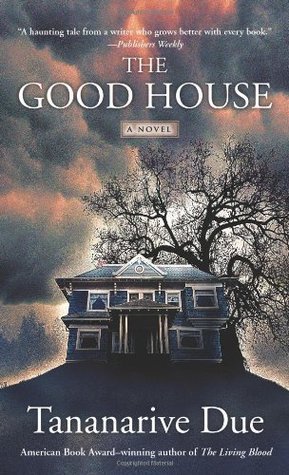 This is my exact perfect kind of horror: Meaty, character-driven, fantastical yet chilling or creepy stories but without the bleak or nihilistic rush some people seem to get when all the characters end up dead—or worse—at the end of a book. No coincidence, methinks, that Tananarive Due namedrops two excellent Stephen King books in here*, because her writing style reminds me a lot of his. Both authors really know how to immerse you in a long story, and give you the payoff at the end you’ve been craving. With Due, we get the added bonus of getting that story from the perspective of a Black woman.
This is my exact perfect kind of horror: Meaty, character-driven, fantastical yet chilling or creepy stories but without the bleak or nihilistic rush some people seem to get when all the characters end up dead—or worse—at the end of a book. No coincidence, methinks, that Tananarive Due namedrops two excellent Stephen King books in here*, because her writing style reminds me a lot of his. Both authors really know how to immerse you in a long story, and give you the payoff at the end you’ve been craving. With Due, we get the added bonus of getting that story from the perspective of a Black woman.
*Pet Sematary and The Stand.
The novel is told across three timelines: First in 1929, when Angela’s grandmother Marie Toussaint earns her reputation as a healer, cementing the name of her house in small-town Sacajawea, Washington as “The Good House” (formerly it was The Goode House, named after its owner Elijah Goode’s family). The book opens with a teaser of an incident that will have far-reaching consequences for the town. Then, in 2001, Angela and her fifteen-year old son Corey—along with Tariq, the husband she has been separated from for four years, but now they’re trying to make things work again—are in town for the summer much to semi-troubled teenager Corey’s dismay. At a party celebrating the 4th of July, which many people from the small town are invited to, Corey dies of a gunshot wound—no one is quite sure whether it was suicide. And finally, two years after Corey’s death, Angela is at last ready to return to Sacajawea to put her memories to rest and to decide whether or not to sell the house. Only, things start happening.
The story is mostly told from Angela’s point of view, but we also get a lot from Corey back in 2001 as we see the events unfold that led up to his death. We also get written record of Marie’s life in the form of excerpts from a book she wrote chronicling her life and instructing her descendants in the practices of Vodun. Marie’s sections were absolutely fascinating to me, but the real payoff comes the longer you spend in Angela and Corey’s POVs. Nisi Shawl wrote that in this book “[Due] tackles the intersection—the collision, really—between violence and young black manhood” (spoilers in that article, by the way), and that feels right. But the book tackles a lot more than that, as well as just being a straight-up satisfying story. Due’s characters aren’t “likable characters,” but flawed, traumatized, and emotionally complex. Perfect fodder for a horror story.
This book will not leave my head. I want to read more books from Tananarive Due. I have now pre-ordered a copy of her newest book, The Reformatory. I want to read The Between. I can feel a little bit of obsession coming on. Sorry in advance?
#Summerween2023
